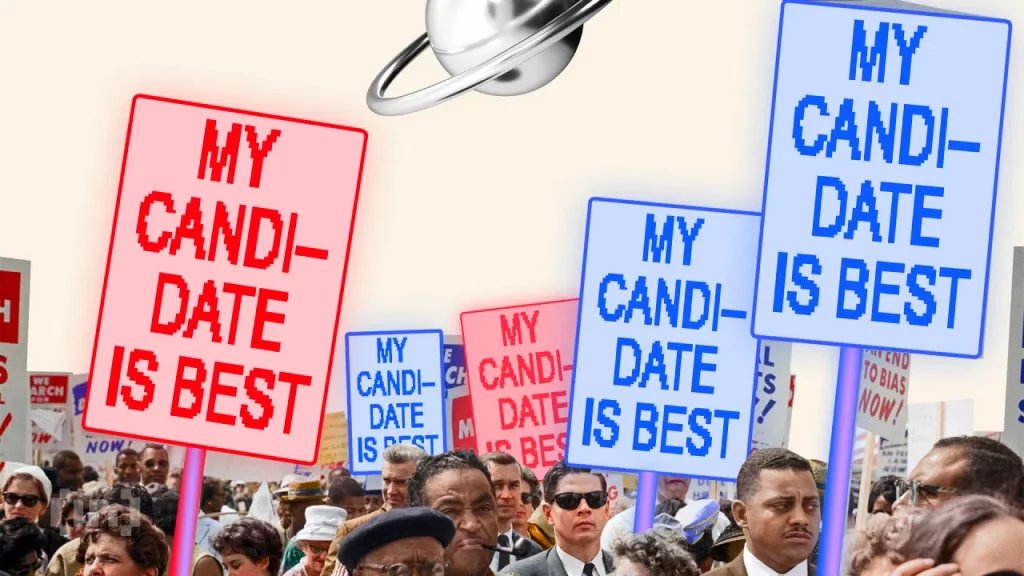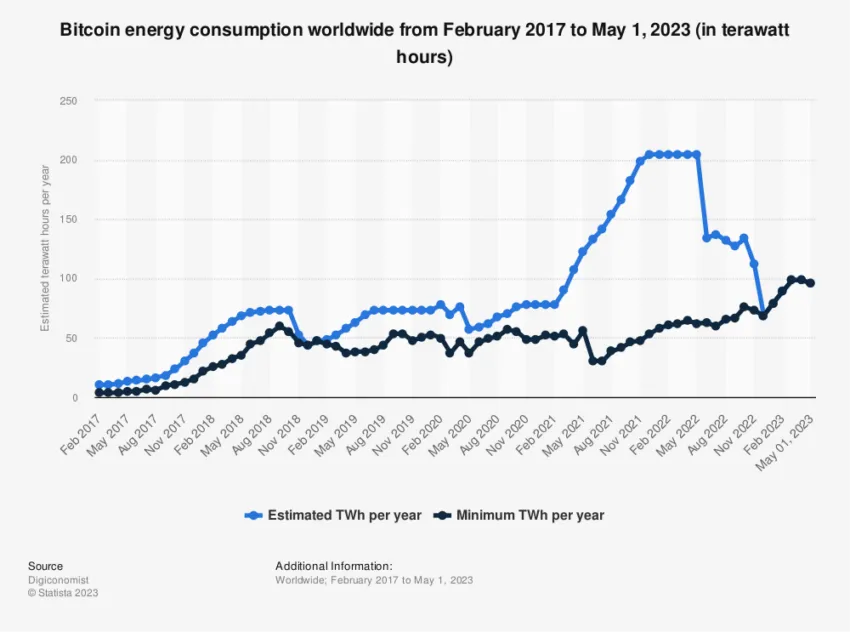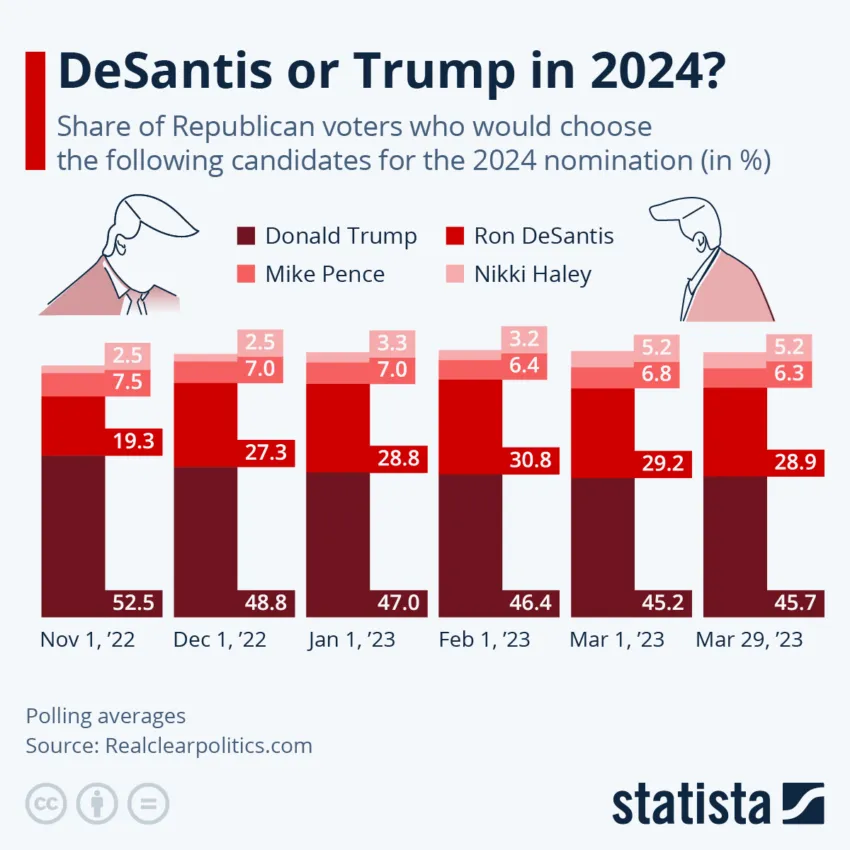US Presidential Candidates Clash to Win Over Crypto Voters

[ad_1]
The popularity of cryptocurrencies continues to rise, and US presidential candidates increasingly try to appeal to the growing number of crypto-savvy voters. With millions of Americans now investing in digital assets, the political landscape is shifting to accommodate this new wave of interest.
As the 2024 US presidential election approaches, various candidates have shared their views and actions on digital assets and blockchain technology.
The Rise of Crypto Voters in America
GMI PAC, a crypto-focused political action committee, was established in January 2022. Its name, “GMI,” stands for the popular crypto slang “gonna make it.” As part of its efforts to gauge the significance of crypto to voters in the US, the PAC commissioned a poll.
The poll’s findings reveal that 44% of US voters own or consider owning digital assets. This suggests that the electorate is beginning to take an interest in crypto policy issues. Of these voters, 17% already own crypto, making them a highly competitive group that both Democrats and Republicans have been targeting in recent elections.
The core group of crypto voters primarily consists of young men under the age of 55, representing 58%. Furthermore, one-third of crypto-owning voters are people of color.
Interestingly, the poll found that crypto voters do not overwhelmingly lean toward one political party. This indicates that both Democrats and Republicans have an opportunity to win their support.
Cryptocurrency ownership spans the political spectrum, with 18% of Democrats, 16% of independents, and 16% of Republicans currently owning digital assets. As such, presidential candidates cannot afford to ignore this significant voting bloc.
Presidential Candidates Courting Crypto Voters in High-Stakes Race
Donald Trump
Former President Donald Trump was initially skeptical of cryptocurrencies, expressing concerns about their volatility, potential for facilitating illegal activities, and competition with the US dollar. In 2019, Trump claimed he was “not a fan” of Bitcoin and other cryptos and criticized Facebook’s Libra project.
“I am not a fan of Bitcoin and other Cryptocurrencies, which are not money, and whose value is highly volatile and based on thin air. Unregulated Crypto Assets can facilitate unlawful behavior, including drug trade and other illegal activity,” said Trump.
Despite his earlier reservations, Trump has recently changed his heart toward crypto. In December 2022, the former president announced the launch of his own NFT collection. This shift in attitude suggests that Trump has become more open to the potential benefits of digital assets and blockchain technology.
Trump’s entry into the NFT space indicates his support for crypto innovation and the growing importance of digital assets in the global economy. His involvement in the industry could potentially influence his future policy positions and encourage a more favorable stance.
While Trump has not explicitly discussed his position on crypto regulation, his past statements regarding the risks associated with digital assets suggest that he is likely to support measures aimed at protecting consumers and investors and addressing potential illegal activities facilitated by crypto.
Ron DeSantis
Florida Governor Ron DeSantis has proactively created a crypto-friendly environment in his state. In June 2021, he signed a bill that established a regulatory framework for digital currencies, making Florida one of the most crypto-friendly states in the US.
DeSantis sees the potential for blockchain technology to revolutionize various sectors, including finance, supply chain management, and healthcare. He supports adopting blockchain solutions nationwide and has encouraged businesses to explore its potential applications while condemning the idea of a Central Bank Digital Currency (CBDC).
“I think what the danger of the digital currency is that, one, they want to make that the sole currency, they want to get rid of crypto. They don’t like crypto because they can’t control crypto. So they want to put everything in a central bank digital currency,” said DeSantis.
Under DeSantis’s leadership, Florida has attracted numerous cryptocurrency and blockchain companies, contributing to the state’s economic growth and creating new job opportunities. He has positioned Florida as an innovation hub, drawing in entrepreneurs and startups nationwide.
DeSantis recognizes the importance of educating the public about crypto and its underlying technology. He also supports initiatives to increase awareness and understanding of digital assets and their potential impact on society and the economy.
Robert F. Kennedy, Jr.
Robert F. Kennedy, Jr., has shown a keen interest in blockchain technology. Especially for its potential applications in various sectors, including environmental conservation. Kennedy is a strong proponent of decentralization and believes blockchain technology can play a role in empowering individuals by curbing reliance on centralized institutions.
He has urged the government to promote the development of decentralized solutions and adopt a regulatory approach that fosters innovation and protects consumers.
“Cryptocurrencies, led by Bitcoin, along with other crypto technologies, are a major innovation engine. It is a mistake for the US government to hobble the industry and drive innovation elsewhere. Biden’s proposed 30% tax on cryptocurrency mining is a bad idea,” said Kennedy.
The Democratic White House contender has voiced concerns over the environmental impact of crypto mining. Particularly regarding the high energy consumption associated with proof-of-work algorithms. He has called for adopting renewable energy sources to power crypto mining operations. The goal is to reduce their carbon footprint and support sustainable development.
“Yes, energy use is a concern (though somewhat overstated), but Bitcoin mining uses about the same as video games and no one is calling for a ban on those. The environmental argument is a selective pretext to suppress anything that threatens elite power structures,” affirmed Kennedy.

While recognizing the potential benefits of cryptocurrencies, Kennedy remains cautious about the risks involved. He emphasizes the importance of consumer protection. Additionally, Kennedy advocates for stronger regulatory measures to prevent fraud and protect investors from bad actors in the industry.
Ted Cruz
Ted Cruz has been a vocal supporter of cryptocurrencies and their potential for fostering economic growth and financial inclusion. The US Senator recently expressed his enthusiasm for Bitcoin, stating that it has “a lot of potential” and urging the US to lead in developing digital assets.
Cruz has criticized excessive regulation in the cryptocurrency space, arguing that it could stifle innovation and hinder the industry’s growth. He believes the government should adopt a “light touch” approach. Thus, allowing businesses and entrepreneurs to thrive without being bogged down by unnecessary bureaucratic constraints.
“Cryptocurrency is generating new jobs, encouraging entrepreneurs to invent new values and creating new hedges against inflation, and presenting new opportunities. It is also increasingly being used as a secure form of payment for goods and services. This is precisely why we, here at the United States Capitol, should increase accessibility and signal our support for the burgeoning cryptocurrency industry to those who visit Capitol Hill,” said Cruz.
The Republican presidential candidate has advocated for the crypto industry’s growth in his home state of Texas. In March, he co-sponsored a bill to establish a regulatory sandbox in the state. It provided a supportive environment for crypto and blockchain startups to innovate and develop new products and services.
“The federal government has no authority to unilaterally establish a central bank currency. This bill goes a long way in making sure big government doesn’t attempt to centralize or control cryptocurrency and instead, allows it to thrive in the United States. We should be empowering entrepreneurs, enabling innovation, and increasing individual freedom—not stifling it,” concluded Senator Cruz.
While supportive of the crypto industry, Cruz acknowledges the risks of investing in digital assets. He encourages responsible investing and urges investors to educate themselves about cryptocurrencies’ potential risks and rewards before diving in.
The Choice Is Yours
As the influence of crypto continues to grow, US presidential candidates increasingly recognize the importance of appealing to crypto voters.

Each candidate discussed has shown varying levels of support for digital assets and blockchain technology. Some advocate for greater regulatory clarity while others support innovation and financial inclusion. Meanwhile, a few even embrace the industry by launching their own crypto ventures.
As the 2024 election approaches, it remains to be seen how these positions will evolve and how they might shape the future of crypto policy in the United States.
Disclaimer
Following the Trust Project guidelines, this feature article presents opinions and perspectives from industry experts or individuals. BeInCrypto is dedicated to transparent reporting, but the views expressed in this article do not necessarily reflect those of BeInCrypto or its staff. Readers should verify information independently and consult with a professional before making decisions based on this content.
[ad_2]
Source link










